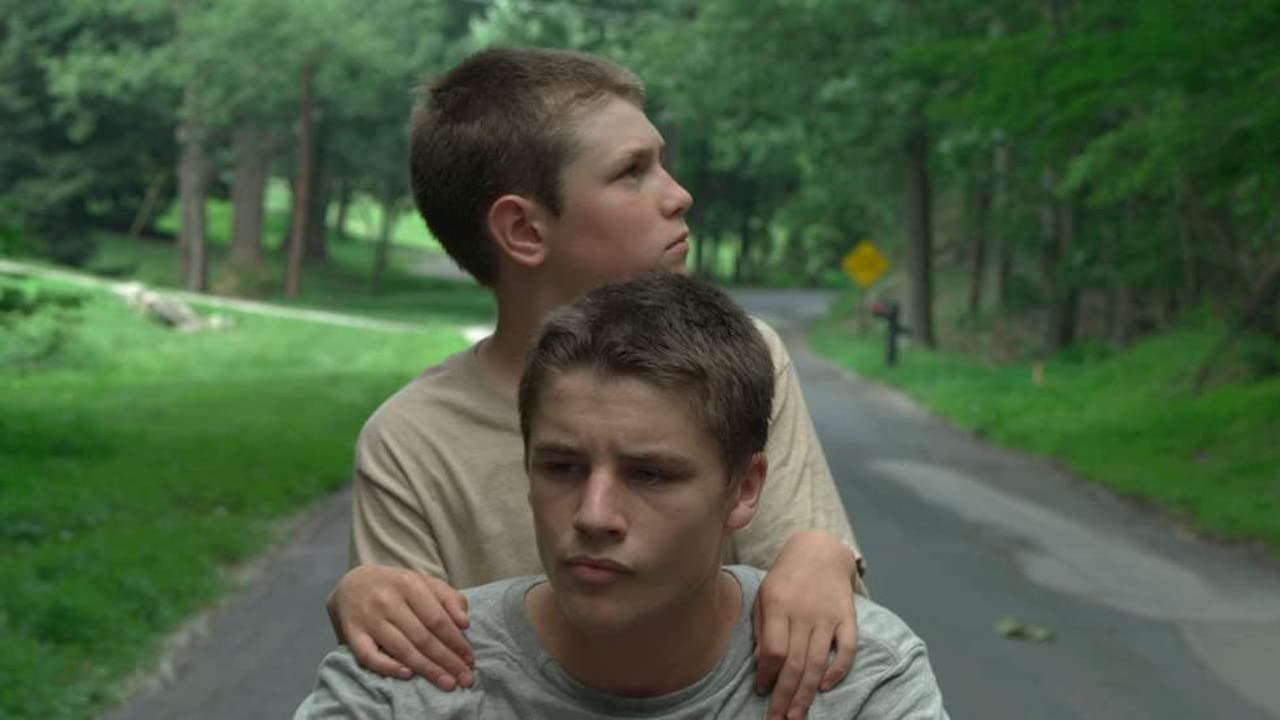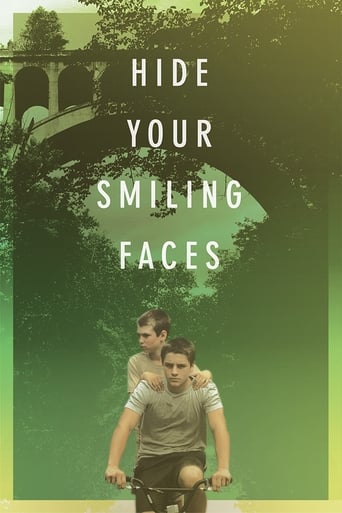Stometer
Save your money for something good and enjoyable
Nonureva
Really Surprised!
ReaderKenka
Let's be realistic.
Billie Morin
This movie feels like it was made purely to piss off people who want good shows
takeusthefoxes
The best coming of age film sense THE DYNAMITER . I usually have no problem rambling on about a great film however in the case of hide your smiling faces when you watch it you will understand why i felt nothing more needed to be said, hope you take the time to enjoy these lovely films
mmagliaro
Honestly, I've seen plenty of offbeat art films where there is no concrete plot and the movie is really about the angst and emotions of the characters. But even then, I expect something to happen. I expect to see some character development, some questions answered, some conclusions.This film offers none of those. It is 90 minutes of some kids rambling around after the mysterious death of one of their friends. We never know what they think, how they feel, or how the events affect them. We never know what to think of their parents, or the dead boy's father.I'm sorry, there is just no plot, no story, not even a thread of one, to hold this thing together. Count how many times one of the characters answers a question, "I don't know" in this film. Every question is answered this way, so you can't form any opinions about any of the characters.I'll leave you with one final thought. The way the scenes cut from one to the next, with no connective tissue between them, they could be shown in almost any order and it wouldn't make any difference.
cicadacrow
This film was very highly rated by the jury of the Heartland Film Festival, an annual event here in Indianapolis, and I was eager to see it. To say I found it disappointing is an understatement.The opening scene of a corn snake slowly swallowing a rather large fish is a good foreshadowing of what the filmmaker requires of his audience. We are being offered an Art Film with a big capital "A". Do we really need yet another film exploring the emotional trials of young white American boys? Perhaps if I had not just seen two major release films dealing with similar material in the last 6 months- the excellent "Mud" and the pretty good "Boys of Summer" I might have had a little more patience with mining this material for fresh insights. The scene where the brothers are introduced to us, at the lake, was promising, though enigmatic. What is their relationship to each other? Is the older boy sexually abusing the younger? The shot of their silhouettes from the rear, where Eric puts on his shirt, and Tommy removes his was a beautiful moment. It was downhill from there. The acting in the scenes in the abandoned house was awkward, and the boys' behavior unnatural. For instance, when Tommy watches Ian playing with the cicada shell he brought home from the abandoned house and asks him what is is, Ian does not reply. I cannot imagine a boy not responding to a direct question like that. I was trying to buy in at this point and waited for the film to hit it's stride, but it never did. The consequences of Ian's death were not depicted in a realistic way, which contradicts the whole point of this supposedly lifelike film. More information about Ian's father and Eric & Tommy's parents would have given the viewer a better understanding of their motivation. There was no sympathy for Ian's father, and the idea that he was either abusive or an alcoholic was never substantiated. The most engaging character in the film was Daisy, the dog. All the characters milled about in lifeless, disconnected pantomimes of real people. The introduction of the gun into the narrative was trite, simplistic,over-used. Unnecessary. Mr. Carbone, couldn't you think of a more creative device to heighten the tension? So the film dragged on, the leaves blew, the water rustled, the rain came and the seasons changed. Nothing was resolved, and there was no transformation as the cicada implied. I could have used a Barf-o-rama scene or a character like Neckbone to relieve the unrelenting tension.In the Q & A session that followed the screening, opinions were mixed, and several people left during the movie. Those who liked the movie lauded its attention to detail, the fabulous cinematography and absolute realism of the characters. I felt like they were describing a film I didn't see!
Clayton Davis
No film at the Tribeca Film Festival or any film in recent memory has captured the cultural and significant impacts of tragedy in the minds of adolescence than Daniel Patrick Carbone's Hide Your Smiling Faces. Engagingly suspenseful, this tale about two brothers, after a tragedy occurs in their rural town, must confront their own demons that include relationships, nature, and morality. Tommy (Ryan Jones) and Eric (Nathan Varnson) are confronted with morally conflicting views of life and as the two try to siphon their own processes surrounding their tragedy, an underlining beauty exists that I'm not sure I fully understand after the film. Hide Your Smiling Faces lays it on and lays it on hard as these two boys encounter several instances of adult situations through the eyes of young children. Writer/director Carbone isn't troubled to ask the tough questions of youth and as the boys battle through their layers of guilt, innocence, and even sexuality, Carbone explores the soul of youth and comes up with a phenomenal portrait that stands proudly next to classics like Stand by Me (1986). The dynamic Nathan Varnson and purely magical Ryan Jones are simply perfection in their roles. Varnson, who is very reminiscent of Hunter McCracken's powerhouse turn in The Tree of Life (2011), is somberly brilliant and he arranges emotion after emotion on top of his youthful persona. His execution is truly dazzling and it's a inspirational performance that stands as the stone pillar of the film. Ryan Jones is equally effective and mounts the single finest scene of any film seen this year so far with absolute precision. Diverse and adaptable in any given scene, these two boys carry the entire framework of the film and are the most beloved trait for you to take home. Daniel Patrick Carbone is a jack of all trades who not only writes and directs the film with an infinite amount of passion but manages to edit the film to a subdued aura that is both pleasing and smooth. Not to mention his intention to give the audience several instances of apprehension that can give a person with a pacemaker an early trip to the grave, Carbone places guns in the hands of children, puts them near the ledges of a bridge, and even puts them face to face with the dangers of nature. While suicide even plays a prominent theme, Carbone's subtle approaches to how one can interpret the death of a loved one are astutely profound. It's damn near perfection in every sense. His filmmaking style and imagery are very Malick-esque and his deep-rooted appreciation for nature is, well, appreciated. What makes him a true professional is he doesn't just lay it on us for the sake of art, he believes in the message that the Mother Nature is trying to convey. Surveying the decomposition of an animal becomes a stapled foundation for the child in all of us to stand on. I found myself richly tearful, examining the mutation of emotions as they manifest themselves into different behaviors. You can't ask more from a film. Not to mention, an eighty-minute endeavor such as this. Hide Your Smiling Faces is a magnificent portrait and Carbone's paintbrush laid strokes of love, anger, confusion, and a rainbow of emotions to indulge the audience. It's one of the most pleasant surprises experienced at a festival thus far. Read More @ The Awards Circuit (http://www.awardscircuit.com)

